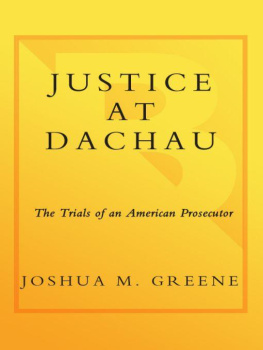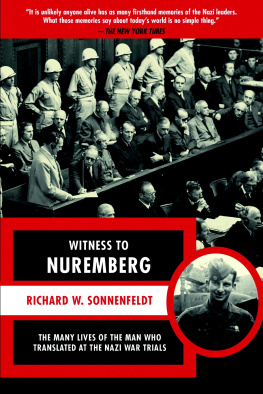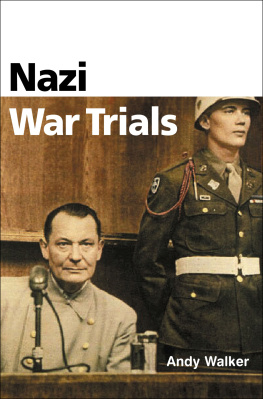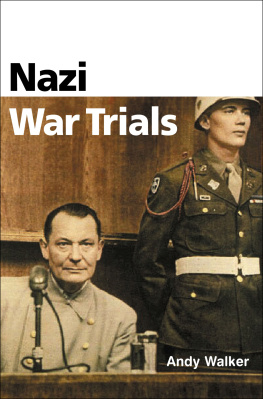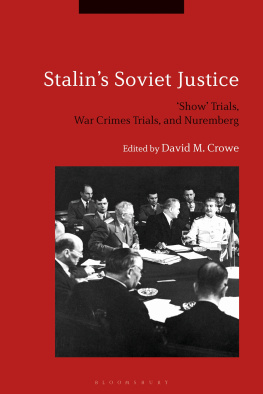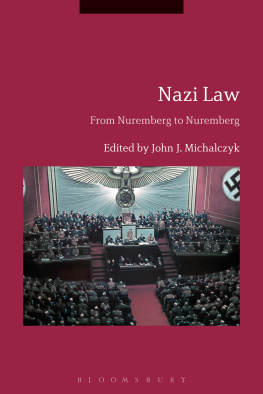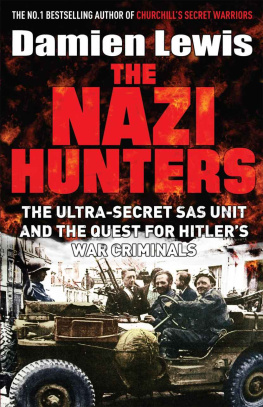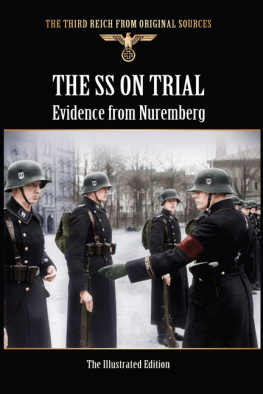Table of Contents
ALSO BY JOSHUA M. GREENE
Witness: Voices from the Holocaust
BROADWAY BOOKS NEW YORK
TO HUSCHI
God loveth a cheerful giver.
II CORINTHIANS 9:7
Bill Densons death deprived the world of one of this centurys great champions of human rights and human dignity. His truly remarkable career inspires awe to this day, particularly among those of us who carry on the work he began.
Eli Rosenbaum, Director
Criminal Division, Office of Special Investigations
United States Department of Justice
1998
Men who take up arms against one another in public war do not cease on this account to be moral beings, responsible to one another and to God.
Francis Lieber
German-American political philosopher
Columbia University
1863
Preface
The boxes in William Densons basement were covered with dust. A few had tipped over during a flood some years back, spilling their contents onto the gray concrete floor. Those that had escaped damage sat on sagging wooden shelves. Huschi, Densons widow, waited a year after his death before she could bring herself to visit her late husbands basement den.
In those boxes were documents dating back half a century. Some were intact. Others crumbled as Huschi removed them. It took weeks of sorting for her to realize the scope of what she had discovered: thousands of pages of trial transcripts, miles of microfilm, stacks of photographs and newspaper clippings, deaths-head insignias, bulging packets of letters from SS officers and victims of Nazi horror, handwritten notes and summationsin all, more than thirty thousand pages and artifacts from one of the most significant yet least known series of war crimes trials in history.
The folders and hand-bound scrapbooks tell the story of the Dachau trials, in which Hitlers henchmen from Dachau, Mauthausen, Flossenburg, and Buchenwald concentration camps were brought to justice. The trials, led by Denson, age thirty-two, exposed concentration camp administrators for what they were: murderers, torturers, and traffickers in human skin. More important, the trials affirmed that civilization is built on universal standards of human behaviorstandards that hold a place apart from and above any nations legal or military agenda.
By the end of the Dachau trials in August 1948, William Denson had prosecuted more Nazis than any other lawyer in the entire postwar period: 177 guards and officers. All were found guilty. Ninety-seven were sentenced to death, fifty-four to life imprisonment, and the rest to terms of hard labor. The proceedings also nearly ended the life and career of chief prosecutor William Denson.
We lived more or less in the same neighborhoodhis office was only ten minutes from my homebut I never had the pleasure of knowing this remarkable man. In interviews videotaped by the Shoah Foundation, the Washington Holocaust Memorial Museum, and other organizations, Denson comes across the way family and friends describe him: keenly intelligent, mannerly, amicable. He stood almost six feet tall, lean, boyish features never quite disappearing in old age. When he spoke his drawl flowed smooth and slow, like the streams he fished as a boy in Alabama. What makes his story so striking is the contrast between the humanity of the man and the inhumanity of the world he took on. The U.S. Army sent Denson to Germany to prosecute abominations so cruel and vast that no law had ever been created to cover them. No vocabulary existed to describe what Nazi officers and men awaiting trial at Dachau had done to their victims. Denson was a country lawyer assigned to prosecute war crimes that the courts of civilized nations had never before confronted.
For twenty-one months, Denson labored in the shadow of headline-making trials taking place sixty-five miles to the north in Nuremberg, where the International Military Tribunal was prosecuting a handful of top Nazi officials. The venue for that trial was the majestic Palace of Justice with two hundred members of the international press in attendance. Densons work, meanwhile, unfolded in almost complete obscurity in a small courtroom cobbled together from workshop tables and folding chairs. Yet something more important than notoriety or grandeur separated the Dachau trials from the Nuremberg trials. At Nuremberg the accused were Nazi policymakers: chieftains who drafted and supported Hitlers battle plans as well as his Final Solution, the systematic annihilation of European Jewry. Hitlers chieftains, however, never lifted a gun. It was at Dachau, sixty-five miles south, on the grounds of the former concentration camp, that men stood trial for personally aiding, abetting, and performing torture and murder compelled not by government policies but by their own disregard for human life.
Densons assignment was to demonstrate that the accused at Dachau were personally responsible for atrocities committed against other human beings. He had to disprove arguments by Buchenwald commandant Hermann Pister that executions of Russian prisoners of war were carried out under legally justifiable superior orders. He had to counter excuses by Dr. Klaus Carl Schilling that lethal experiments in Mauthausen to find a cure for malaria were conducted in the interests of humanity. He had to reveal Ilse Koch for what she was: not the obedient wife of a camp commandant, but a sexual sadist who collected human skins and had prisoners killed for daring to look at her. The U.S. Army put Denson in the middle of these horrors and told him to win convictionsand to do it quickly.
The young lawyer, away from America for the first time, confronted formidable obstacles. Of great concern was the accusation that any convictions he might win would amount to nothing more than victors justice. The term denoted executions handed down by courts guided more by vengeance than due process, and it hovered darkly over the Dachau trials, threatening to destroy not only the validity of guilty verdicts but the credibility of those who, like himself, sought to defend the integrity and effectiveness of international law. In war, the accusation implied, victors will always be in the right, the defeated always culpable of crimes for which they must pay. Many who understood the depth of the Holocaust tragedy felt that executing Hitlers henchmen without trial was a perfectly legitimate punishment. Why dignify Nazi killers by providing them with trials? The murder of six million Jews and millions of other victims merited a swifter, more effective kind of response. To insist on proving in a courtroom what had so obviously been done was not to serve justice but to make a mockery of it. Allowing Nazis to stand trial, these voices argued, also meant risking that many might go free.
Denson disagreed and went to great lengths preparing his cases according to recognized rules of law, winning as many enemies as admirers. Trials meant to end quickly dragged on as he and his team of investigators interrogated hundreds of potential defendants and witnesses. What the Judge Advocates Office hoped would take two months took nearly two years. The work was further complicated by defense accusations that many of the accused had been coerced into signing their confessionsa charge that plagued the trials from start to finish and led to an investigation that only partially exonerated the American interrogators.
Densons dedication to his task took a personal as well as professional toll. His first wife, a New York socialite who had never adjusted to the life of a stay-at-home bride, left him halfway through the trials. His health deteriorated as constant exposure to descriptions of Nazi atrocities robbed him of his appetite and wore away at his body. By the end of his third trial he had lost nearly fifty pounds, his hands trembled, and he suffered a collapse. After less than two weeks recovery time, Denson rallied enough strength to lead a fourth and final trial: guards and officers from Buchenwald concentration camp.

